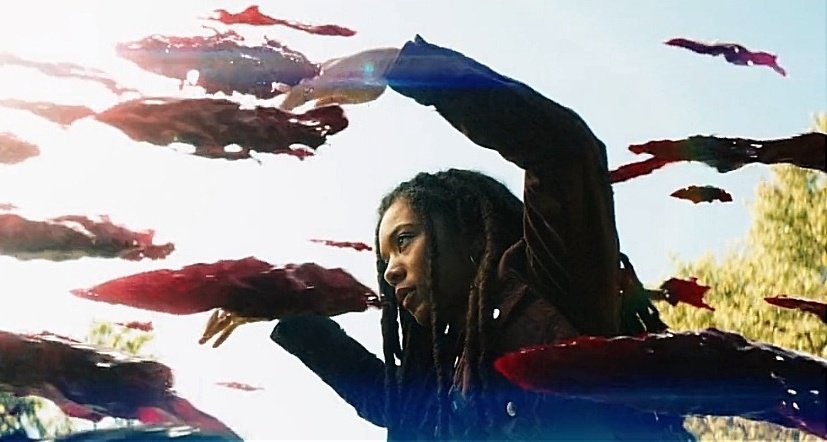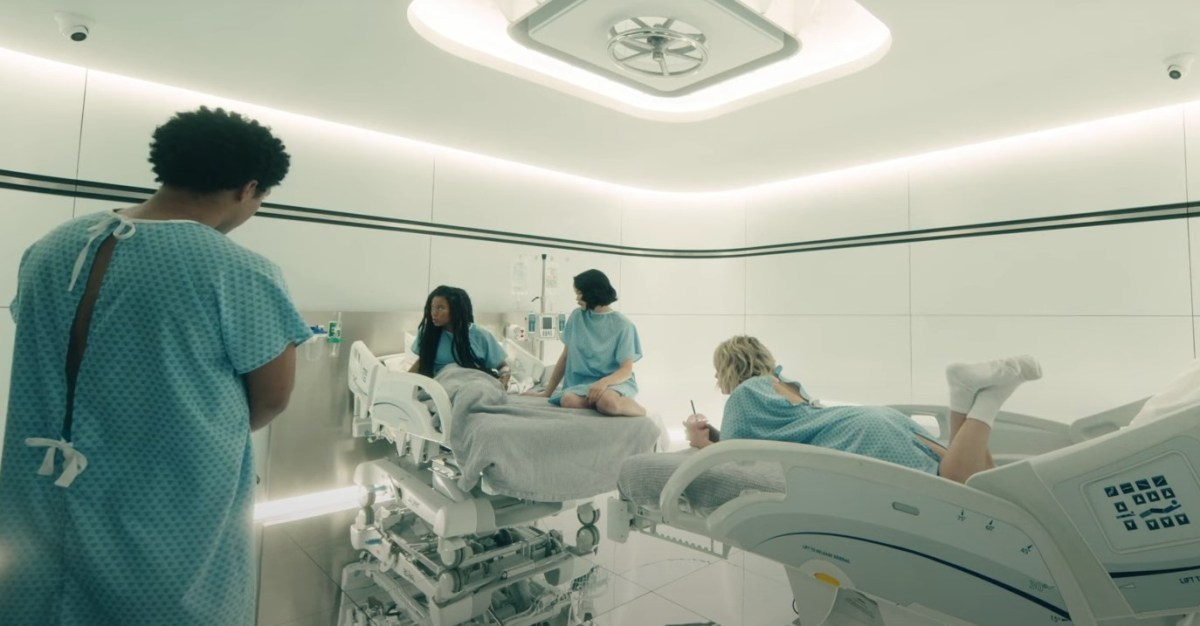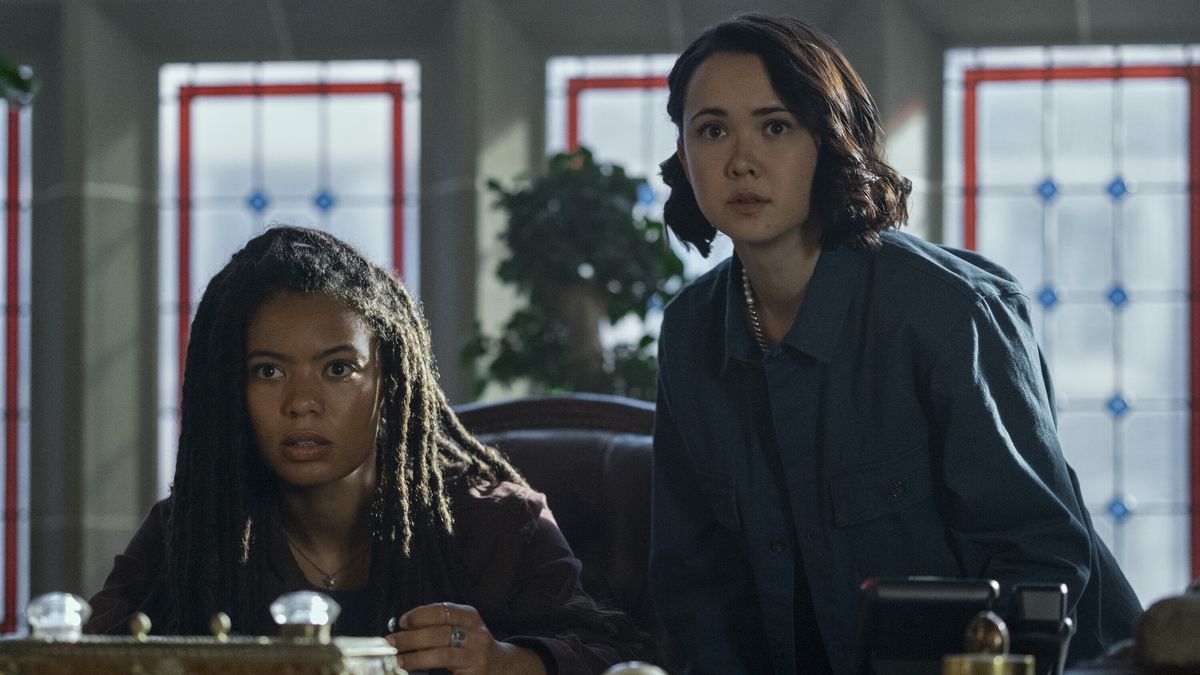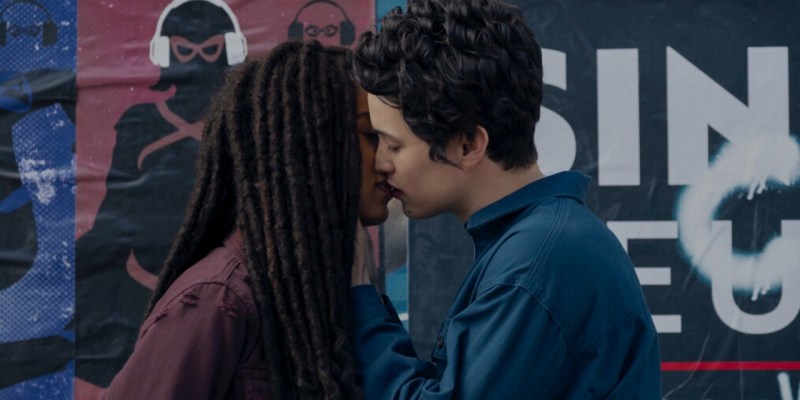This review and recap of Gen V Season 1, Episode 8 finale, “Guardians of Godolkin,” contains spoilers.
“Guardians of Godolkin” rounds out the first season of Gen V with a deeply cynical conclusion. It’s an episode of television that really shouldn’t work, in which the stars of this show find themselves displaced by cameo appearances from the two leads of their parent series. On paper, this is the sort of nonsense that tends to derail modern franchise streaming shows, like The Mandalorian or Ahsoka. However, against all odds, “Guardians of Godolkin” mostly works, because this is what the show is.
Throughout the first season of Gen V, there has been a strange and unusual optimism that set the show at odds with The Boys. Characters like Marie (Jaz Sinclair) and Andre (Chance Perdomo) have found themselves confronted by the jaded worldview of The Boys, and responded by rejecting it. These young characters seem to earnestly want to be heroes. They are not as cynical as Tek Knight (Derek Wilson). Despite all evidence to the contrary, they believe that they can make a difference.
“Guardians of Godolkin” suggests that this youthful optimism was all setup for a cruel punchline. Of course, this was seeded in Marie’s conversation with Victoria Neuman (Claudia Doumit) in “Sick.” It is reiterated in Polarity’s (Sean Patrick Thomas) advice to Andre. “It’s your time,” Polarity assures Andre. “You’re the big man now. You follow the straight and narrow. Do whatever they tell you. No one gets through life without regrets.” It’s hardly a stirring monologue about doing the right thing.
“Guardians of Godolkin” features a number of significant cameos from The Boys. Obviously, Ashley Barrett (Colby Minifie) and Adam Bourke (P.J. Byrne) return from their earlier guest spots in the season. However, the end of the episode features two short but significant appearances from the elder statesmen of The Boys. Homelander (Antony Starr) shows up to put an end to the chaos at Godolkin and Billy Butcher (Karl Urban) appears briefly in the post credits scene.
On the surface, this is a deeply cynical choice. It undermines the Gen V characters by marginalizing them in their own show. It’s similar to the cameo from Luke Skywalker (Mark Hamill) at the end of the second season of The Mandalorian and the way that Anakin Skywalker (Hayden Christensen) seems to make Ahsoka all about himself. It takes the oxygen out of the room, like He Who Remains (Jonathan Majors) showing up at the end of the first season of Loki to tease The Kang Dynasty.

However, the guest appearances of Homelander and Billy Butcher in “Guardians of Godolkin” work better than most of these “content soup cameos” because they serve a thematic point. The show is intentionally exploring the subtext of the nostalgia that underpins so many of these crossovers. It’s a problem that Ahsoka isn’t actually a story about Ahsoka (Rosario Dawson), but is instead about how Anakin Skywalker is still the most important. However, this is exactly the point that Gen V is making.
Gen V sets up the idea that its young protagonists might be able to tell their own story, set their own terms, and craft their own narratives. Marie and Andre hope that they can reject the cynicism imposed on them by their elders. They earnestly believe that doing the right thing will be enough to make a difference. “I just wanted to be a hero,” Marie confesses to Cate (Maddie Phillips), coming close to an epiphany. “But I don’t give a shit anymore. I just want to be a good person.”
The cruel twist of Gen V is that it doesn’t matter what Marie wants. “But Marie, you are not a person,” Cate replies. “You are a product to them, a freak. I’m trying to save you.” Marie doesn’t have enough power or influence to change the world. She cannot bend reality to conform to her will. Instead, Homelander arrives on the scene as the very embodiment of the cynicism of The Boys, as articulated by characters like Neuman and Polarity, and imposes his reality upon the situation.
Marie and Andre don’t get to set the narrative of what happened at Godolkin University. That falls to Cameron Coleman (Matthew Edison), who reports that “four Godolkin students went on a brutal murder spree” that was ultimately stopped by Cate and Sam (Asa Germann), who have been crowned “the New Guardians of Godolkin.” Homelander watches the news report and smirks. This is a complete rejection of what Gen V seemed to believe. It is a very Boys twist on the story.
Homelander’s cameo is the culmination of larger forces pushing Gen V more firmly into the orbit of The Boys. The episode’s title card features an establishing shot of Vought Tower, a location central to The Boys. A student (Robert Bazzocchi) does a dramatic reading from Dawn of the Seven. Maverick (Curtis Legault) is revealed to be the son of Translucent (Alex Hassell). Translucent’s death marked the start of The Boys, while Maverick being knocked unconscious rounds out the first season of Gen V.
Indeed, Homelander’s arrival effectively cuts Gen V short. Clocking in at just over 35 minutes, including the aforementioned credits scene, “Guardians of Godolkin” is the shortest episode of the season. There is something very abrupt about all of this. Homelander arrives, silences Marie, utters three sentences, and then blasts her with his heat vision before the episode fades to black. When the episode resumes, it is in Vought Tower, headquarters for The Boys. The characters are trapped there, locked away in a cell.

Narratively, this probably shouldn’t work. Logically, it is frustrating to see the protagonists of a show so brutally marginalized in their own finale. However, it works thematically. It is a brutal and earnest reminder of the hierarchy of these shows — that Gen V unfolds within the world of The Boys, rather than vice versa. It is also a deeply cynical piece of political commentary, a reminder that all those idealistic young people with optimistic beliefs rarely have enough power to truly change the world.
Of course, “Guardians of Godolkin” is still leaning on the tropes that defined this first season of Gen V. The show is still very heavily indebted to the X-Men franchise. Even Polarity’s spasms recall Charles Xavier’s (Patrick Stewart) loss of his powers in Logan. While Dean Indira Shetty’s (Shelley Conn) attempted genocide of these superheroes is a familiar X-Men story, “Guardians of Godolkin” swaps it out for an even more archetypal X-Men narrative, one that traces its roots back to X-Men #1.
Cate and Marie fight over the appropriate response to humanity’s mistreatment of superheroes. Cate finds herself cast in the role of Magneto, a superpowered individual who believes that she is inherently superior to homo sapiens. “You’re not inferior,” Cate tells her followers. “You are superior to them. And it’s time we showed it.” This places Marie and Andre in the role of the traditional X-Men, fighting to protect humans like Ashley Barrett and Adam Bourke.
That said, one of the more interesting aspects of this heavy X-Men influence on the first season of Gen V is the way in which it draws from some of the comics’ more fascinating eras. In particular, Grant Morrison and Frank Quitely’s New X-Men resonates strongly with Gen V, most obviously with the trip inside Cate’s head in “Jumanji.” It is appropriate, then, that “Guardians of Godolkin” draws heavily from Morrison and Quitely’s last collaboration on New X-Men, “Riot at Xavier’s.”
“Riot at Xavier’s” is a storyline that has aged in very interesting ways, arguably feeling more relevant today than when it was published two decades ago. Like “Guardians of Godolkin”, “Riot at Xavier’s” imagines a militant student uprising at a superhero school, in which the young rioters declare themselves inherently superior to human beings. At the time, Morrison and Quitely seemed to be offering a millennial riff on the campus protest culture of the 1960s. In hindsight, it feels prophetic.

The eponymous riot is masterminded by a young mutant named Quentin Quire. Although the character has been softened in subsequent portrayals by writers like Jason Aaron, Quire is an unsettling creation. In character design and philosophy, Morrison and Quitely’s take on Quire looks like a prototype for the alt-right. Just look at Quire and his fellow rioters: they have the familiar hairstyle, the straight-laced boots, and even the suit shirt and pants.
Quire is a young man whose rebellion stems from frustration. He feels betrayed, that he was “promised peace and security” that never materialized. In the final moments of the riots, he admits that he did it all in the hopes that the female students would “look up to [him].” Quire is a lost boy, and it’s interesting that the first season finale of Gen V builds to a similar idea, with both Cate and Sam acting out of their own insecurities.
In “Jumanji” and “Sick,” Cate seemed to desperately long to be loved. That is why she was initially entranced by Shetty. She seems shocked by the revelation that Shetty truly loved her. In “Guardians of Godolkin,” Sam is haunted by visions of his brother Luke (Patrick Schwarzenegger), who tries to reassure Sam that he is loved. “But you said you were me,” Sam tells that projection. “And trust me, I hate myself.” So much modern violence is driven by young people who externalize their self-hatred.
Indeed, this puts a nice thematic bow on the season. For many of the characters in Gen V, their powers are tied to self-harm or self-hatred. Marie had to cut herself to use her powers. Emma (Lizze Broadway) would purge to get small. Jordan (London Thor, Derek Luh) would present as the boy that their father (Peter Kim) wished they had. In “Guardians of Godolkin,” it is revealed that both Polarity and Andre are tearing up their brains every time that they use their powers.
While the ending of “Guardians of Godolkin” is a deeply cynical commentary on Marie’s lack of agency, it does feel like she has experienced a character arc. Marie learns to use her blood powers in ways that don’t involve self-harm. Emma shrinks without purging, even if she is “belittled” by Sam. It’s obviously not emotionally ideal, but it suggests that Emma might learn to control her powers without needing to vomit.
Amid this bleak resolution, there is some small sense that these young characters can be healthy. They might not be able to save the world, but perhaps they can save themselves.
